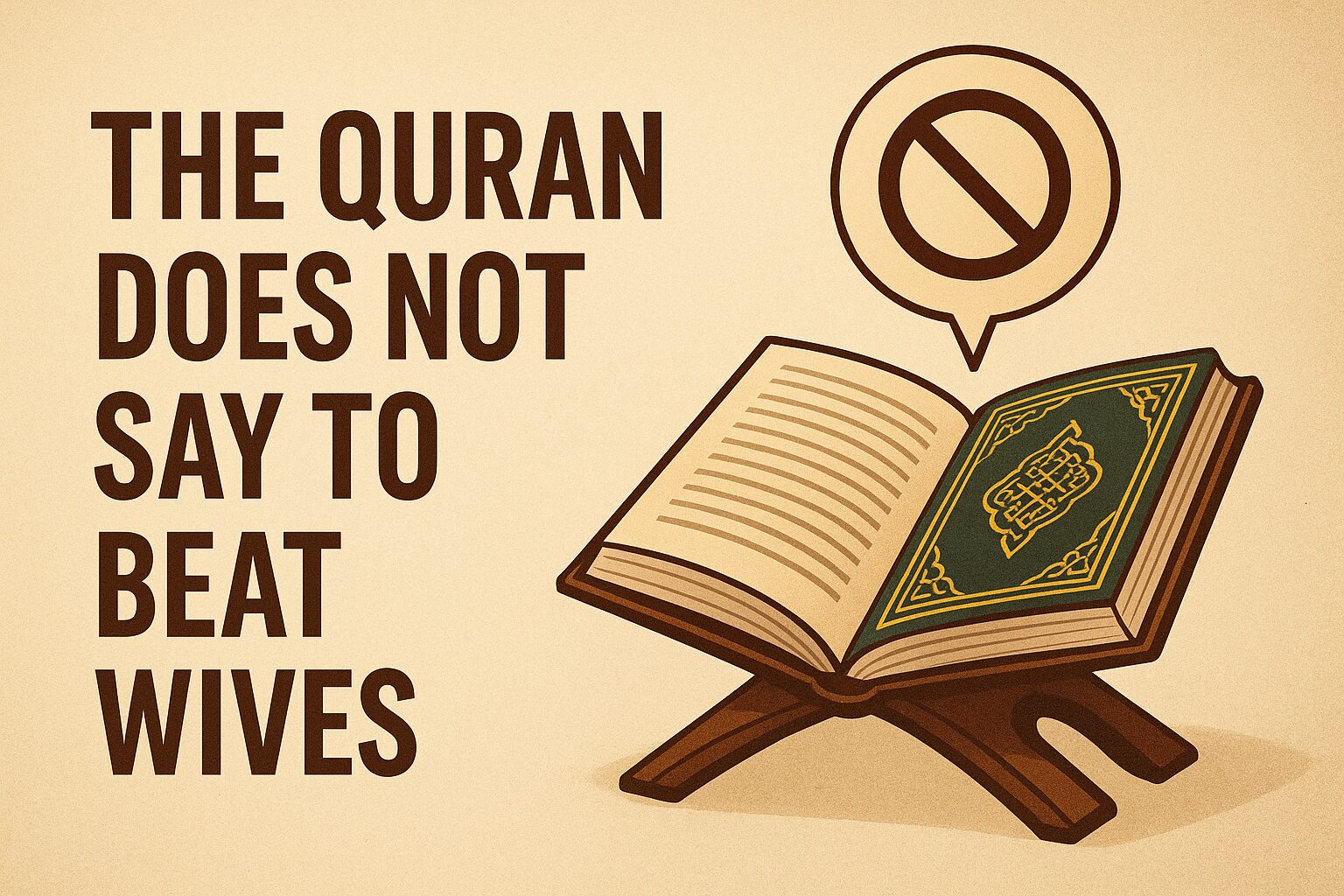Salamun alaykum, dear readers!
There is a notion that women in Islam must be housewives and cannot earn money or be the primary income earner at home.
This notion is false, therefore Muslim women should not feel guilty for making money or having a career other than housewife, and Muslim men should not feel guilty for being a stay-at-home dad or househusband, taking care of household affairs while the wife is at work.
The idea is based on verse 4:34, which tells men to be “qawamoon” (maintainers) over their spouses.
- [4:34] The men are the maintainers over the women by what God has favored some of them over some, including by what they have spent of their money…
What Does Being The Wife’s Maintainer Mean?
So this verse is saying that men are supposed to be maintainers of their women by using their wealth and resources.
The term “qawamoon” is plural for “qaim” and is derived from the noun “qiyam” which means to stand. So the job of a “qaim” is a maintenance job, which means to keep something in good standing, or good condition, on an as-needed basis.
- An example of a “qaim” (maintainer/custodian) is a janitor who “maintains” the floors and bathrooms by cleaning them when they get dirty.
So if men are the “qawamoon” (maintainers) over the women, that does not necessarily mean that men are the only financial providers of the household and that women are not allowed to make money or work. If the wife makes $60,000 per year, and the husband make $30,000 per year, whatever deficiencies she has in her finances should be covered by his money, to help maintain her good financial condition.
So that means men are responsible for helping their women on an as-needed basis.
So if a woman chooses to be a housewife, or she works but her income is not sufficient to pay the bills, then it is the duty of the husband to make all the money needed by the household, in order to fulfill his role as the “qaim” and “maintain” the good condition of his wife.
But if she is a career woman and makes more than enough money for the couple and chooses to be the primary provider (perhaps she is a millionaire or wealthy business owner, or makes enough to comfortably cover the expenses of the household), then very little financial maintenance is required from the husband. His duty as maintainer is to have enough money saved over to help the wife with financial maintenance as needed by her.
- Though hypothetically, if she were a millionaire but chooses not to use any of the money to pay the living expenses of the household, then it is the job of the husband to pay for all of the living expenses of the household.
So in short, this gives the wife the right to choose how much of her own money she wants to contribute to paying for household expenses, and the husband fills in the gaps as much as needed by the wife.
- If she doesn’t make money, or makes plenty of money but does not wish to use any of her own money to pay for household expenses like rent, groceries, utilities, and more, then the husband has to pay all living expenses.
- If she is in debt or gets herself into financial trouble, the husband has to consider it like his own debt and do what he can to help her pay it back, including if she is hypothetically a millionaire but refuses to use her own money to pay back her own debt.
- If she makes plenty of money and chooses to pay all or most of the living expenses, then the husband’s job as “maintainer” is to provide as much as needed by the wife, whether small or large.
To give an analogy, the requirement of a man to be the “maintainer” (qawamoon) of his wife is like having a vehicle. If the vehicle is in need of repair and maintenance (as changing the battery, tires, or oil) then it is the job of the vehicle owner to make sure the vehicle is well-maintained by undergoing repairs and changes as needed. The vehicle owners are the “qawamoon” (custodians/maintainers) of their vehicles in this sense.
- Different kinds of vehicles need different amounts and rates of maintenance. Some vehicles need more maintenance than others. Motorcycles need more frequent maintenance than cars, and bikes and scooters need far less maintenance than motor vehicles.
- Likewise, if the wife is unemployed she will need full financial maintenance from the husband, but a wealthy career woman probably needs not as much financial maintenance from the husband.
Therefore, being the financial maintainer means being able to provide as much money as needed to care for the needs of the wife, and the needs of the wife will be different depending on whether she is unemployed, a wealthy businesswoman, or whether or not she chooses to spend her own money on living expenses and debts, or anything in between.
Thus, the husband being the maintainer does not mean the wife is prohibited from being a career woman or the husband is prohibited from being the househusband.
Though if he is to serve as a househusband while the wife works, then he must at least make sure he has enough resources saved up to cover any deficiencies that arise in the wife’s finances if they arise, as that is what he should do as maintainer.
And money is not the only way for men to do the role of “qawamoon” and maintain a wife’s good condition. The Quran says that men are the maintainers “by what God favored some of them over some”, which means by using any resource that is available and needed, because God favored some people with more resources than others.
- Money is just one resource among others. Other resources that a man can use to provide for his wife are time, attention, and emotional support, medical or first aid support, helping to relieve her stress, etc.
Wife-Beating Is Not Allowed
There is a false notion that the Quran allows wife-beating, but really that’s not true.
Many people mistranslate verse 4:34 to mean that the husband beats the wife, but that is untrue. The verse doesn’t really say to beat the wife, and it’s a mistranslation.
Let’s analyze this verse:
- [4:34] The men are the maintainers over the women by what God has favored some of them over some, including by what they spent of their money. Thus, the righteous women are devout guardians for the unseen, like how God has guarded. But the ones whose high-handedness you fear, you shall thus advise them, desert them in the bed, and “idrib” them. But if they obeyed you, then do not seek a way against them. Indeed, God is High, Great.
The word in contention here is “idrib”, and it the command form of “daraba” which is an Arabic word with multiple meanings. In the Quran, there are multiple meanings for the word.
The meanings are:
- Strike or beat (2:60-61, 3:112, 47:4),
- to present an example (43:57, 30:28, 13:17),
- to withdraw or separate (43:5, 4:34),
- to seal or cover (18:11),
- to draw over (24:31),
- to attribute (43:17),
- to establish (57:13).
There are multiple-meaning words in English too. Just as professor Edip Yuksel said, “Many tried to ‘beat’ around the bush to ‘beat’ the problem generated by the word ‘beat’ of 4:34”.
Obviously, if any word has multiple meanings, context clues must be use to find out the correct meaning of the word.
The word in 4:34 can’t be :beating” for a few reasons:
- If the verse commanded us to beat the wives, it would violate some Quranic principles. One is verse 2:187, which says that the spouses are like garments for each other (in that they warm each other with love and affection, among other ways), and wife-beating is absolutely contrary to this.
- We are told in verse 30:21 that affection and mercy should exist between the spouses, and beating is counterproductive to both.
- Also, we are told in verse 4:128 that reconciliation is the best option. How then can beating be allowed if it decreases the chance of reconciliation?
- In 4:21, the husband and the wife “becomes one” (they are like one flesh and blood, dependent on each other for happiness and survival), thus hurting one is akin to hurting one’s self in marriage.
- The very next verse after this one (4:35) discusses what to do in case the couple fears a split between each other. We can therefore reasonably infer that the previous things mentioned in 4:34 were to calm things down, rather than inflame tensions by beating.
The only meaning that makes sense in the case of high-handedness is to separate/withdraw from them.
What Does Nushuz Mean? Are Women Supposed to Obey Their Husbands?
Some have said that verse 4:34 commands women to obey their husbands, because 4:34 discusses “nushuz” from a woman, which people interpret as disobedience.
But it cannot mean disobedience. Verse 4:128 talks about the husband committing nushuz towards the wife. So if the Arabic word nushuz meant disobedience, then who has the power in the relationship if both husbands and wives are able to commit nushuz? Does the wife disobey the husband, or does the husband disobey the wife?
Rather, the most commonly-understood (and correct) meaning of nushuz is high-handedness or behaving in an unreasonable, aggressive, domineering way.
And the way to deal with nushuz (high-handedness or domineering behavior) from the wives according to 4:34 is not to incite further aggression by beating them, but to separate from them until they have calmed down.


Leave a Reply